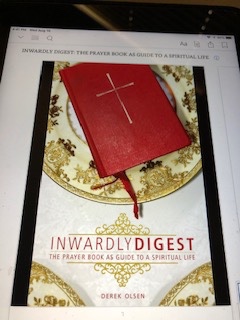I’ve done several things recently related to spiritual growth. At the counsel of my pastor, I have sought out a spiritual director and I have started reading Richard Rohr. I think the first will be helpful. We haven’t met except for a preliminary superficial connection. But today I will sign our contract and send it back. People have pointed me to Richard Rohr for years. I have not taken the time until now. I am reading his daily meditation as well as one of his books: Falling Upward: A Spirituality for the two halves of Life.
The backstory, as we say these days: When I retired, one of my goals was to develop my spirituality so I can be a better catechumenate minister. I looked for books on spirituality and the catechumenate. The first thing I came up with that looked pretty inviting was Inwardly Digest: The Prayer Book as Guide to a Spirituality. This gave me a better appreciation of the BCP but did little to help me discern God’s presence in my life or how to go about that. Then our new dean, Mathew Woodard, came on the scene in June. I told him what I was trying to do. He asked me if I had a spiritual director or a confessor and advised that I get one immediately. He also said that he didn’t think that I should lead the catechumenate until I had done some real work, guided work, in the area of my own spiritual growth. In fact, as time went on, he asked me who else could lead the catechumenate. Right away, he saw that my going it alone was not going to work. He is right. That is not the path to greater “spiritual enlightenment.” He kept pressuring me. I kept avoiding the search. Finally, after it became clear that he was not going to let me continue to lead the catechumenate until I had done some real work, I took up the search.
I met with Matthew earlier this week because I had asked to attend vestry meetings (virtually). He said that he wanted to talk about it. He asked me if I knew what it felt like for him to receive an email from him before he had even started at Trinity. I didn’t and I still don’t understand what he is saying in that question. I wanted to talk to him early on about the catechumenate. Admittedly, I did use the excuse of updating him on the Trinity of the past decade as an excuse. During our first conversation he quickly moved from the “things” of the past 10 years to the state of my spiritual quest. This has been the case with subsequent meetings as well. In this most recent discussion he asked me why I wanted to start attending Vestry meetings. I told him that I am interested in that part of parish life and that I am feeling disenfranchised from Trinity. He said that he didn’t want me to attend meetings at this time, not because the vestry has anything to hide but rather because he thinks I need more time to step back from any leadership role in the parish.
Initially I was angry with Matthew. I was tempted to close my laptop and terminate our Zoom meeting. As our conversation proceeded I realized that what he was asking me to do was take time to set aside my ego in terms of feeling a need to lead. Good leadership involves becoming of the gifts, skills, talents that others bring and allowing them to use those gifts. I need to realize that other people can do what I was doing. I need to realize that Trinity’s life will go on without me. Specifically, in terms of the catechumenate, I need to realize that others can and perhaps should lead. And, though Matthew did not directly say it, I am pretty sure that he realizes the power of the catechumenate and intends to keep it going at Trinity.
This conversation, along with the new direction I am taking in terms of spiritual development has helped me realize that what I need to do is to step back, diminish my ego and let the Divine guide my life. In the words of one reflection of Richard Rohr: “Be quiet and let God be God.”


